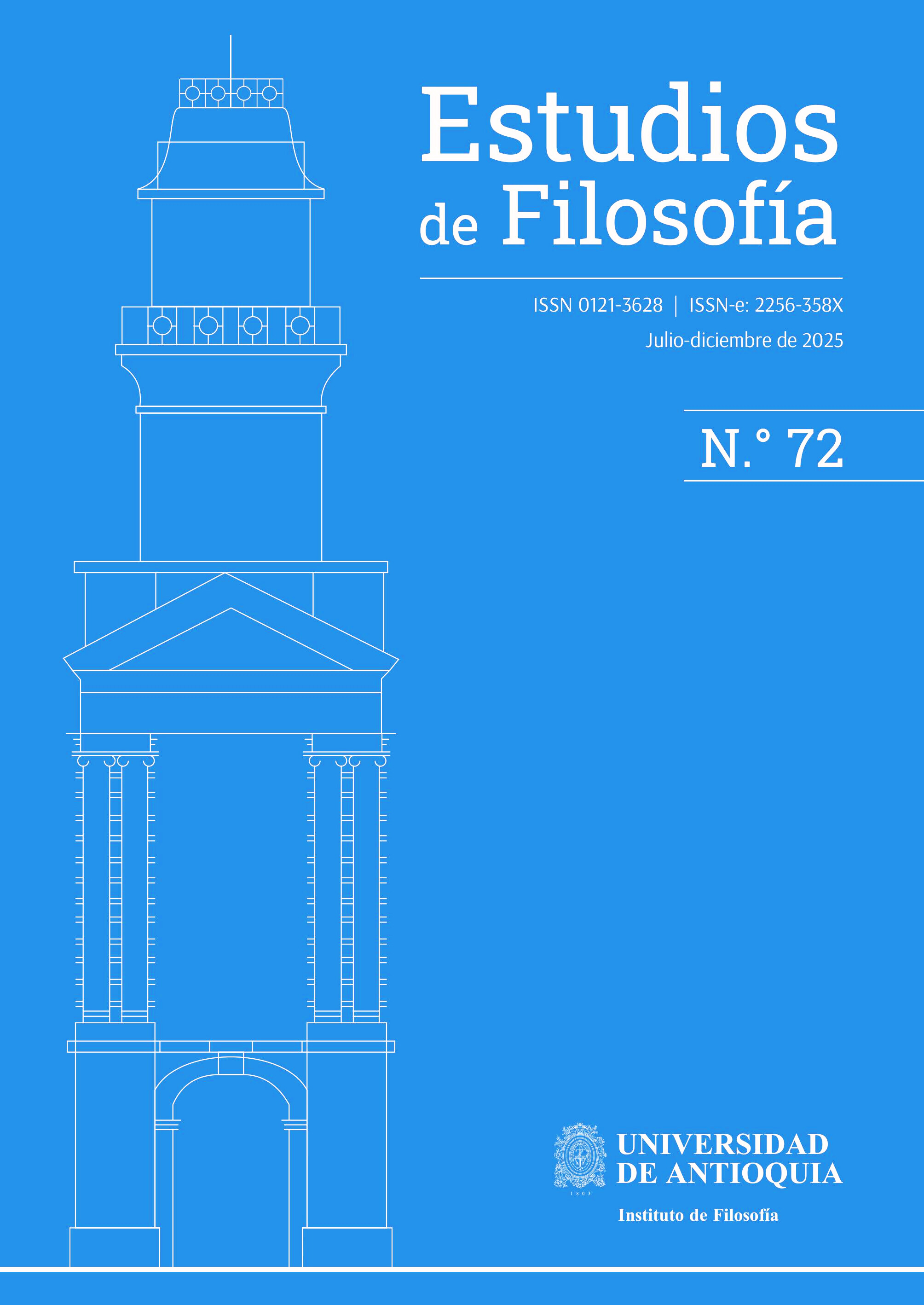How Melogno prevented Hall from interfering with the use of Lewis's theory: Double prevention under debate.
DOI:
https://doi.org/10.17533/udea.ef.356189Keywords:
Causation, Counterfactuals, Double prevention, Locality, OverdeterminationAbstract
In this paper we discuss Ned Hall's critique of David Lewis's counterfactual theory of causation, in particular for its alleged inability to account for cases of double prevention. To do so, we focus on Pablo Melogno's response to Hall, where he claims that Hall's proposed tension between the concept of dependence and the locality thesis in cases of double prevention is the effect of the omission of essential details to complete the causal chain in the examples used by Hall. Here we propose to take a further step in the defense of the counterfactual theory begun by Melogno, by reviewing the examples proposed by Hall, the modifications complexified by Melogno and the corollaries that follow from them, and proposing some relevant conceptual extensions to the ideas of the three authors.
Downloads
References
Dowe, P. (2000). Physical Causation. Cambridge University Press. https://doi.org/10.1017/CBO9780511570650
Goodman, N. (1947). The Problem of Counterfactual Conditionals. Journal of Philosophy, 44, 113-128. https://doi.org/10.2307/2019988
Hall, N. (2004). Two concepts of causation. In J. Collins, N. Hall & L. Paul (Eds.). Causation and Counterfactuals (pp. 225-276). MIT Press. https://doi.org/10.7551/mitpress/1752.003.0010
Lewis, D. (1973a). Causation. Journal of Philosophy, 70, 556-567. https://doi.org/10.2307/2025310
Lewis, D. (1973b). Counterfactuals. Blackwell.
Lewis, D. (1986a). Postcripts to ‘Causation’. Philosophical Papers. Vol. II (pp. 172-213). Oxford University Press. https://doi.org/10.1093/0195036468.003.0006
Lewis, D. (1986b). Causal Explanation. Philosophical Papers. Vol. II (pp. 214-240). Oxford University Press. https://doi.org/10.1093/0195036468.003.0007
Lewis, D. (2000). Causation as Influence. Journal of Philosophy, 97, 182-197. https://doi.org/10.2307/2678389
Melogno, P. (2011). La preservación de la tesis de la localidad para los casos de doble prevención en la crítica de Ned Hall al análisis contrafactual. Análisis filosófico, 31(1), 47-66. https://doi.org/10.36446/af.2011.122
Miguel, H. (2009). La representación gráfica de las interacciones causales. In M. Casanueva & B. Bolaños (Eds.). El giro pictórico (pp. 106-143). Anthropos.
Miguel, H. (2011). Contrafácticos en contextos sin leyes: el caso del Exocet y la Sheffield. In M. Velasco & N. Venturelli (Eds.). Epistemología e Historia de la Ciencia. Selección de las XXI Jornadas. Vol. 17 (pp. 299-306). Universidad Nacional de Córdoba.
Miguel, H. (2014). Herramientas para una topografía de estados de cosas. (Primera parte: el tiempo). Cuadernos de Filosofía, 32, 27-42.
Miguel, H. (2019). Teorías contemporáneas de la causación. In C. Vanney, I. Silva, J.F. Franck (Eds.). Diccionario Interdisciplinar Austral, http://dia.austral.edu.ar/Teorías_contemporáneas_de_la_causación [Accessed: 06/02/2024]
Miguel, H., Paruelo, J. (2007). Causar o dejar que ocurra. Andamios. Revista de Investigación Social, 4(7), 7-18. https://doi.org/10.29092/uacm.v4i7.312
Pagès, J. (2003). Causalidad, dependencia contrafáctica e influencia. Análisis Filosófico, 22(2), 193-235.
Schaffer, J. (2000). Trumping Preemption. Journal of Philosophy, 97, 165-181. https://doi.org/10.2307/2678388
Downloads
Published
How to Cite
Issue
Section
Categories
License
Copyright (c) 2024 Leandro Giri; Hernán Miguel

This work is licensed under a Creative Commons Attribution-NonCommercial-ShareAlike 4.0 International License.
Authors who publish with this journal agree to the following terms:
1. The Author retains copyright in the Work, where the term "Work" shall include all digital objects that may result in subsequent electronic publication or distribution.
2. Upon acceptance of the Work, the author shall grant to the Publisher the right of first publication of the Work.
3. The Author shall grant to the Publisher a nonexclusive perpetual right and license to publish, archive, and make accessible the Work in whole or in part in all forms of media now or hereafter known under a Creative Commons Attribution-NoCommercia-ShareAlike (CC BY-NC-SA 4.0), or its equivalent, which, for the avoidance of doubt, allows others to copy, distribute, and transmit the Work under the following conditions: (a) Attribution: Other users must attribute the Work in the manner specified by the author as indicated on the journal Web site;(b) Noncommercial: Other users (including Publisher) may not use this Work for commercial purposes;
4. The Author is able to enter into separate, additional contractual arrangements for the nonexclusive distribution of the journal's published version of the Work (e.g., post it to an institutional repository or publish it in a book), as long as there is provided in the document an acknowledgement of its initial publication in this journal;
5. Authors are permitted, and Estudios de Filosofía promotes, to post online the preprint manuscript of the Work in institutional repositories or on their Websites prior to and during the submission process, as it can lead to productive exchanges, as well as earlier and greater citation of published work (see The Effect of Open Access). Any such posting made before acceptance and publication of the Work is expected be updated upon publication to include a reference to the Estudios de Filosofía's assigned URL to the Article and its final published version in Estudios de Filosofía.















